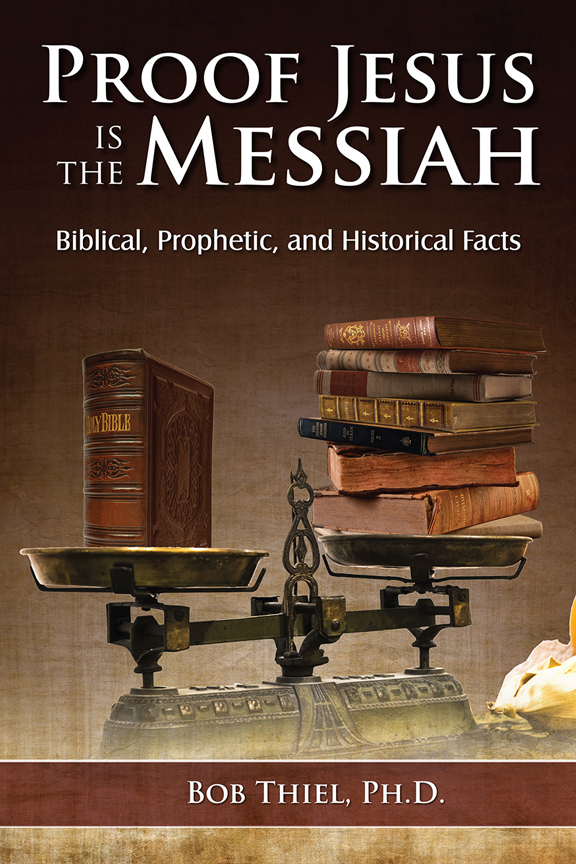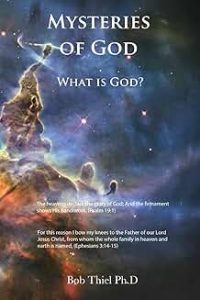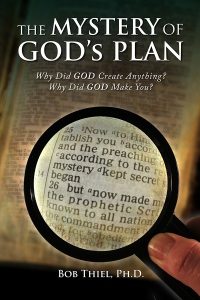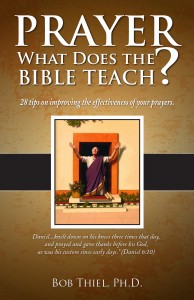Wow! So many wrong understandings.
First of all, Jews only must convert to Christianity if they want to be saved. Yet, Bishop Bowers does not understand that. Notice what the Apostle Peter told Jewish leaders:
ALL, INCLUDING JEWS, MUST ACCEPT JESUS TO BE SAVED.
Jews are included in the every knee must bow to Jesus.
Secondly, notice what the Apostle Peter said the day he received the Holy Spirit to a predominantly Jewish crowd who asked what they needed to do:
Sadly, Bishop Bower does not seem to properly understand God’s plan of salvation.
Now, let me add that according to various Jewish writings, if Jews paid enough attention to certain specific ones, they would accept Jesus.
The above is saying that 4000 years after Adam and Eve were created that the Messianic era would begin. And that is basically correct in the sense that Jesus came about 4000 years after Adam and Eve were put out of the Garden of Eden. Yes, even according to the School of Elijah (which is what ‘Tanna debe Eliyyahu’ means) teaching of scripture, Jesus came when the Messiah was supposed to come.
Here is some information about the Jews, why they do not accept Jesus, and some reasons why their own accepted writings show that they should from our free online book Proof Jesus is the Messiah:
[Y]ou may be asking yourself, “If Jesus filled/fulfilled over 200 Hebrew scriptures, then why don’t all the religious Jews believe?”
Basically, for a combination of reasons.
Here is a summary of six of the main arguments against Jesus’ messiahship from some Jewish leaders:
- They do not believe that all the prophecies Jesus fulfilled were messianic.
- They do not believe that the Gospel accounts are accurate.
- They believe that there were key messianic prophecies that Jesus did not fulfill.
- They believe that Christians misunderstand timing and Daniel 9.
- They rely on post-biblical traditions.
- They see many errors in what is considered to be Christianity.
As far as that first item goes, the Jews (and others) need to consider that humans do not always understand how God works.
Consider the following about God to humankind, including the Jews:
8 For My thoughts are not your thoughts, Neither are your ways My ways, saith the LORD. 9 For as the heavens are higher than the earth, So are My ways higher than your ways, And My thoughts than your thoughts. (Isaiah 55:8-9, JPS of 1917)
Although many Jews (and others) do not believe that a lot of prophesies Jesus fulfilled were messianic, that does not mean that they were not. The fact that God’s thoughts and ways are higher than ours hopefully will give all (Jews and non-Jews) reasons to consider that perhaps they should give further consideration to the prophesies they had not considered as messianic.
Jews do acknowledge that Jesus lived and was executed. The Jewish Encyclopedia states:
Founder of Christianity; born at Nazareth about 2 B.C. (according to Luke iii. 23); executed at Jerusalem 14th of Nisan, (Jacobs J, et al. Jesus of Nazareth. The Jewish Encyclopedia: A Descriptive Record of the History, Volume 7. 1906, p. 160)
And while 4 or 5 B.C. is probably the year of His birth, Jesus was executed on the 14th of Nisan as The Jewish Encyclopedia states—which is the date of the biblical Passover (Leviticus 23:5).
Claims that Certain Prophecies Were Not Messianic
On the surface, various prophecies that New Testament writers pointed to that Jesus fulfilled do not clearly appear to be prophetic or messianic.
Although many of those do not bother the Jews, one of the biggest Jewish arguments against Jesus’ messiahship is a view that the Messiah was not supposed to suffer and die. Yet, Christians (correctly) assert that those were truly messianic ones that Jesus fulfilled.
The Jewish Encyclopedia goes so far as to assert (bolding mine):
Yet it would almost appear that in one sense of the word Jesus regarded himself as fulfilling some of the prophecies which were taken among contemporary Jews as applying to the Messiah. It is doubtful whether it was later tradition or his own statements that identified him with the servant of Yhwh represented in Isa. liii.; but there appears to be no evidence of any Jewish conception of a Messiah suffering through and for his people, though there possibly was a conception of one suffering together with his people. (Jacobs, p. 163)
Notice that the Jewish position is not based on any scriptures that state the Messiah would not suffer and die, but essentially on what is claimed to be Jewish tradition. Jesus, Himself, warned against relying on Jewish tradition when it was in conflict with scripture (e.g. Matthew 15:3-9). Isaiah foretold:
14 And He shall be for a sanctuary; but for a stone of stumbling and for a rock of offence to both the houses of Israel, for a gin and for a snare to the inhabitants of Jerusalem. (Isaiah 8:14, JPS)
The Apostle Paul wrote that the execution of Jesus was a stumbling block to the Jews (1 Corinthians 1:23), and it has been.
Now, the Jews are correct that the suffering idea was not a Jewish conception — but that is because it was conceived by GOD as the FIRST and INDISPENSABLE PART of the plan of salvation for humankind before the foundation of the world (cf. Revelation 13:8)! The idea of a suffering Messiah is clearly biblical as can be shown in the Hebrew scriptures.
As far as any Jewish traditions go, the assertion “there appears to be no evidence of any Jewish conception of a Messiah suffering through and for his people” is false.
Various Jewish scholars have concluded that there was a Messiah who would suffer and die and one who would reign.
Notice the following from the Hungarian-Jewish author Raphael Patai:
Messiah ben Joseph, also called Messiah ben Ephraim, referring to his ancestor Ephraim, the son of Joseph, is imagined as the first commander of the army of Israel in the Messianic wars. He will achieve many signal victories, but his fate is to die at the hands of Armilus in a great battle in which Israel is defeated by Gog and Magog. His corpse is left unburied in the streets of Jerusalem for forty days, but neither beast nor bird of prey dares to touch it. Then, Messiah ben David comes, and his first act is to bring about the resurrection of his tragic forerunner.
Scholars have repeatedly speculated about the origin of the Messiah ben Joseph legend and the curious fact that the Messiah figure has thus been split in two. It would seem that in the early legend, the death of the Messiah was envisaged, perhaps as a development of the Suffering Servant motif. A prophecy of Daniel, … is the earliest source speaking of the death of a Mashiah (“Anointed”) sixty-two (prophetic) weeks after his coming and after the return and the rebuilding of Jerusalem (Dan. 9:24-26). While it appears that Daniel had a temporal ruler in mind, whom he calls Mashiah Nagid (“Anointed Prince”), … later, the author of 4 Ezra unmistakably refers to the Messiah, belief in whom had developed in the meantime, when he puts words in the mouth of God to the effect that after four hundred years (counted from when?), MY son the Messiah shall die (4 Ezra 7:27-30).
When the death of the Messiah became an established tenet in Talmudic times, this was felt to be irreconcilable with the belief in the Messiah as the Redeemer who would usher in the blissful millennium of the Messianic age. The dilemma was solved by splitting the person of the Messiah in two: one of them, called Messiah ben Joseph, was to raise the armies of Israel against their enemies, and, after many victories and miracles, would fall victim to Gog and Magog. The other, Messiah ben David, will come after him (in some legends will bring him back to life, which psychologically hints at the identity of the two), and will lead Israel to the ultimate victory, the triumph, and the Messianic era of bliss.
This splitting of the Messiah in two persons, which took place in the Talmudic period, achieved another purpose besides resolving the dilemma of the slain Messiah. According to an old tradition, the Messiah was perfectly prefigured in Moses. But Moses died before he could lead the Children of Israel into the Land of Promise. Consequently, for the parallel to be complete, the Messiah, too, had to die before accomplishing his great task of ultimate Redemption. Since however, the Messiah would not be the True Redeemer of God if he did not fulfill that ultimate task, the only solution was to let one Messiah, like Moses, die, and then assign the completion of the work of Redemption to a second Messiah. (Patai R. The Messiah Texts: Jewish Legends of Three Thousand Years. Wayne State University Press, 2015, pp. 165-166)
Thus, to suggest that no Jewish scholars felt the Messiah could suffer or die is false. Furthermore, though the above comes up with two Messiahs, the Bible shows that Jesus came once—and fulfilled over 200 prophecies—and that Jesus will come a second time to fulfill others.
Notice also, there is a hint, associated with the Dead Sea Scrolls, that God’s Anointed was going to suffer related to Isaiah 52:14:
Isaiah … 52:14 includes an obscure hapax legomena מִשְׁחַת that appears in 1QIsaa as משׁחתי which pointed would be מְשַׁחְתִּי məšaḥtî, “I anointed”. This, in conjunction with the added definite article on ʾadam, results in a text which Hengel translates: “I have anointed his appearance beyond that of any (other) man, and his form beyond that of the sons of humanity [the human]”. This has other textual overtones bringing the passage into an explicit connection with “anointing”.
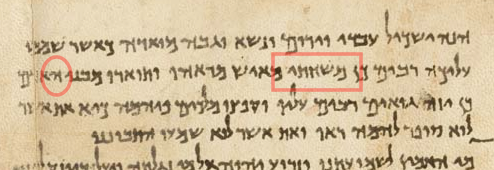
Portion of Isaiah 52:14
(Source: Is there evidence that Isaiah 53 was viewed as a Messianic prophecy within Judaism, or is it an exclusively Christian interpretation? Christianity Stack Exchange. See also Janowski B, Stuhlmacher Wm. B. Eerdmans Publishing, 2004, pp. 103-104)
The Dead Sea Scrolls were from Jewish, not Christian, sources. Most of the Dead Sea Scrolls are believed to have been written before Jesus was born. The portion above comes from the “Great Isaiah Scroll”, 1QIsaa., believed to have been written over a century before Jesus’ birth.
Furthermore, consider something from the Targum Jonathan, in the portion known as the Targum Isaiah. (The targums were—mainly in Aramaic—spoken paraphrases, explanations and expansions of scripture that began to be developed by the Jews shortly before the time of Jesus. The targums probably received the bulk of their editing in written form during the second century and were considered to be completed by the fourth century.)
Notice how the Targum Jonathan renders Isaiah 52:13:
Behold my servant Messiah shall prosper, He shall be exalted and extolled, and He shall be very strong: (Uzziel JB. The Chaldee Paraphrase on the Prophet Isaiah. London Society’s House, 1871, p. 181)
While the Targum Jonathan has various issues, the above passage shows that at least one Jew thought Isaiah 52 had messianic implications. Consider that when you tie that in with the following verse:
14 According as many were appalled at thee— So marred was his visage unlike that of a man, And his form unlike that of the sons of men— (Isaiah 52:14, JPS)
Clearly, some ancient Jewish writers did believe that the Messiah was prophesied to suffer.
And then there is this in the Talmud which cites Isaiah 53:4:
- Giddal said in Rab’s name: The Jews are destined to eat [their fill] in the days of the Messiah. R. Joseph demurred: is this not obvious; who else then should eat — Hilek and Bilek? … Rab said: The world was created only on David’s account. Samuel said: On Moses account; R. Johanan said: For the sake of the Messiah. What is his [the Messiah’s] name? — The School of R. Shila said: His name is Shiloh, for it is written, until Shiloh come. The School of R. Yannai said: His name is Yinnon, for it is written, His name shall endure for ever: e”er the sun was, his name is Yinnon. The School of R. Haninah maintained: His name is Haninah, as it is written, Where I will not give you Haninah. Others say: His name is Menahem the son of Hezekiah, for it is written, Because Menahem [“the comforter”], that would relieve my soul, is far. The Rabbis said: His name is “the leper scholar,” as it is written, Surely he hath borne our griefs, and carried our sorrows: yet we did esteem him a leper, smitten of God, and afflicted. R. Nahman said: if he [the Messiah] is of those living [today], it might be one like myself, as it is written, And their nobles shall be of themselves, and their governors shall proceed from the midst of them. Rab said: if he is of the living, it would be our holy Master; (Sanhedrin 93b)
Rabbi Yehoshua said to Rabbi Eliezer: But isn’t it already stated: “So says the Lord, Redeemer of Israel, his Holy One, to him who is despised of man, to him who is abhorred of the nation, to a servant of rulers: (Sanhedrin 97b, v. 17)
The Zohar tradition, which is one of the comparatively less censored Rabbinic sources, offers its own material on the Messianic interpretation of Isaiah 53. … One of the Zohar’s thoughts on Isaiah 53 speaks about the Messiah as follows:
“The departed souls will arrive and tell the Messiah (about their lives), and when they describe to him the sufferings which Israel is undergoing in her dispersion, that they are guilty because they do not wish to know their Lord, he will raise up his voice and weep on behalf of those who are guilty of this, as it is written: “He was pierced for our transgressions, he was crushed for our iniquities. “ And then those souls will rise and stand up in their posts. There is a castle in the Garden which is called the “house of the sick”. In that day the Messiah will enter into that castle and will shout, May all the sickness and pains of Israel come upon me!” and they will come. If he did not relieve Israel’s pains and take them upon himself no-one would be able to suffer on behalf of Israel’s oppression, of which it is written in the Torah: And it is written: “In truth he did bear our sicknesses”.”
As we can see, both the Zohar as well as the Talmud are depicting the Messiah as a pre-existent figure who shares and carries the sufferings and even the sins of Israel in her dispersion. Santala R. THE MIDRASH OF THE MESSIAH. 2002, pp. 108-109).
On the Great Day of Atonement the Jew feels that his sins must be forgiven before God. On that day even Isaiah 53 is sometimes mentioned. Although Isaiah 53 has been omitted from the annual reading of the prophets, so called haphtaroth, it appears in a remarkable prayer which is read in the Synagogue. The separate prayerbook for the feast days, the Mahzor Rabbah, contains a literary prayer by Rabbi Eleazar Qalir which may be from the ninth or even from the sixth century AD. … The main body of the prayer reads as follows:
“Then, before the creation, he already set up the Temple and the Messiah (the Rabbis” interpretation) – the Messiah our Righteousness has turned away from us, we are shaken, and can find no-one who can justify us. The yoke of our sins and our transgressions is a burden to us; and he was wounded for our transgressions, he suffered on his shoulders our iniquities-, there is forgiveness for our sins. In his wounds we are healed; it is time to create for ever a new creation. Send him back from the circles, bring him back from Seir, so that we might hear him in Lebanon a second time through Yinnon. He is our God, our Father, our King, he is our Saviour and he will liberate and redeem us for a second time and let us hear of his grace a second time in everyone’s sight, as it is said: “I will save you at the end as at the beginning so that I will be your God.” (Santala, pp. 111-112)
Thus, there are several reasons to conclude that some early Jews did believe that some of the passages of the servant in Isaiah 52/53 were messianic. Denying that in the 20th and 21st centuries does not change historical facts. The fact that the old Atonement prayer supports the idea of a second coming of a messiah from a Jewish perspective is also interesting.
Perhaps it should be pointed out that Risto Santala translated a portion of the Ruth Rabbah V,8,1 as follows:
the kingdom taken from him for a time … he was restored to his kingdom (Santala, p. 126)
The above is consistent with a second coming of the messiah, like Christians teach.
Jews should also consider that scriptures, from Genesis 4:4 on, show that sacrifices were carried out. The powerful story of Abraham’s sacrificing his son should have shown to all those who claim to be Abraham’s descendants the fact that there must be a sacrifice for the sins of humankind. And that it is logical that God would consider sacrificing His own son.
The 22nd Psalm, as well as the 53rd chapter of Isaiah, shows the agonizing suffering the Messiah would go through.
Consider also that a man was prophesied to be killed for a guilt offering and suffer FOR the sins of others:
9 He was given a grave among the wicked; in his death he was with a rich man. Although he had done no violence and had said nothing deceptive, 10 yet it pleased ADONAI to crush him with illness, to see if he would present himself as a guilt offering. If he does, he will see his offspring; and he will prolong his days; and at his hand ADONAI’s desire will be accomplished. 11 After this ordeal, he will see satisfaction. “By his knowing [pain and sacrifice], my righteous servant makes many righteous; it is for their sins that he suffers. (Isaiah 53:9-11, Complete Jewish Bible)
The idea of a human sacrifice for sins of others was not something that Christians made up—the Hebrew scriptures taught it and some Jewish scholars have long realize that.
Furthermore, in the Talmud it is actually claimed that the Messiah, son of Joseph, would be killed (bolding and scriptures in the source: sefaria.org):
It is stated: “The land will eulogize, each family separately; the family of the house of David separately, and their women separately, the family of the house of Nathan separately, and their women separately” (Zechariah 12:12). …
Apropos the eulogy at the end of days, the Gemara asks: For what is the nature of this eulogy? The Gemara answers: Rabbi Dosa and the Rabbis disagree concerning this matter. One said that this eulogy is for Messiah ben Yosef who was killed in the war of Gog from the land of Magog prior to the ultimate redemption with the coming of Messiah ben David. And one said that this eulogy is for the evil inclination that was killed.
The Gemara asks: Granted, according to the one who said that the lament is for Messiah ben Yosef who was killed, this would be the meaning of that which is written in that context: “And they shall look unto Me because they have thrust him through; and they shall mourn for him, as one mourns for his only son” (Zechariah 12:10). (Sukkah 52a)
While the timing in the Gemara is not right, this IS PROOF that the claim that the death of the Messiah was something only Christians saw in the Old Testament is not true. By the way “ben Josef” means “son of Joseph”—which Jesus was considered to be (Luke 3:23; John 1:45).
So, in essence, Sukkah 52a is saying that the Messiah would be considered the son of Joseph and that He would be killed. That was the case with Jesus.
The fact that the Gemara ties Zechariah 12:10 in with the Messiah, should give Jews pause to consider that it is correct for Christians to also tie Zechariah 12:10 in with Jesus (which they do with John 19:34-37; Matthew 27:3).
In addition, because it is tied in with Zechariah, this view of the Messiah being considered as a son of Joseph may well have been the Jewish understanding BEFORE Jesus was born. Perhaps God revealed that to someone, similar to how God’s Spirit revealed to Simeon that he would not die until he saw the Christ (Luke 2:25-26).
Consider also the following from Jewish writer Israel Knohl:
According to the seventh-century apocalyptic text known as Sefer Zerubabel, the “Messiah son of Joseph” was killed by the wicked “Armilus” and was further resurrected by the Messiah son of David and the Prophet Elijah. … Some evidence, however, indicates that the figure of “Messiah son of Joseph” is much older. In some texts from around the turn of the era, we encounter Joseph as a son of God who atones for the sins of others with his suffering. For example, in Joseph and Aseneth, written between 100 B.C.E. and 115 C.E. Joseph is described as “son of God” (6:3, 5, 13:13). Joseph is also called “God’s firstborn son” (18:11, 21:4, 23:10).
In another book from the Second Temple period, The Testament of the Twelve Patriarchs, the Testament of Benjamin connects Joseph and the figure of the Suffering Servant in Isaiah 52–53. In this testament, Jacob says to Joseph:
“ ‘In you will be fulfilled the heavenly prophecy, which says that the spotless one will be defiled by lawless men and the sinless one will die for the sake of impious men’ “ (emphasis supplied).
These citations suggest that the designation of the suffering Messiah as the “son of Joseph” goes back to sources from the Second Temple period. (Knohl I. The Messiah Son of Joseph “Gabriel’s Revelation” and the birth of a new messianic model. Biblical Archaeology Review 34:5, September/October 2008)
The “Second Temple period” ran from c. 530 BCE to 70 CE/A.D. Thus, the idea of a suffering messiah, as God’s son, is NOT simply a Christian invention. …
Daniel 9
The ninth chapter of the Book of Daniel has been used by various ones claiming Christianity as a type of numeric proof that Jesus was the Messiah.
Actually, it has often been pointed as strong proof of Jesus’ messiahship. Since Christians did not write the Book of Daniel, many believe that Jews (and others) should accept the messiahship of Jesus because of the timing associated with prophecies in Daniel 9.
Notice some of what Daniel was inspired to write:
24 Seventy weeks are decreed upon thy people and upon thy holy city, to finish the transgression, and to make an end of sin, and to forgive iniquity, and to bring in everlasting righteousness, and to seal vision and prophet, and to anoint the most holy place. 25 Know therefore and discern, that from the going forth of the word to restore and to build Jerusalem unto one anointed, a prince, shall be seven weeks; and for threescore and two weeks, it shall be built again, with broad place and moat, but in troublous times. 26 And after the threescore and two weeks shall an anointed one be cut off, and be no more; and the people of a prince that shall come shall destroy the city and the sanctuary; but his end shall be with a flood; and unto the end of the war desolations are determined. (Daniel 9:24-26, JPS)
How is this proof of Jesus’ messiahship?
Well, it shows that the Messiah was clearly to come before the Temple is destroyed.
26 Then, after the sixty-two weeks, Mashiach will be cut off and have nothing. The people of a prince yet to come will destroy the city and the sanctuary, but his end will come with a flood, and desolations are decreed until the war is over. (Daniel 9:26, CJB)
The “anointed one” is the Messiah (rendered as the “Mashiach” in the Complete Jewish Bible).
So, the Messiah had to come before the Temple was destroyed. If not, the Bible is not true and Jews should consider the ramification of Daniel 9:26.
Furthermore, the prophecy in Daniel 9:24 ties the timing of the “anointed one/Mashiach” in verse 26, to a decree. This is the decree of Ezra 7:12-26. Daniel also mentions that Jerusalem will be rebuilt and that happened as we can see in the Book of Nehemiah.
Daniel 9:25 says that after the cutting off of the “anointed one” the city (Jerusalem) will be destroyed and the sanctuary (the Temple) will be destroyed as well. The sanctuary/temple was destroyed by General Titus in 70 A.D.
In the Continuing Church of God, we have taught that Jesus was resurrected in 31 A.D. or possibly 30 A.D. (this is also partially based upon the date on the Hebrew calendar Jesus took His last Passover, plus outside confirmation related to darkness that happened per Matthew 27:45, Mark 15:33, and Luke 23:45). Hence the Temple was destroyed after the Messiah came.
Now, let’s look at an explanation from the old Radio Church of God about the Daniel 9 prophecy:
At the time of Jesus’ life on this earth, Herod — the king in Judea — the wise men from the nations to the east, and many of the priests, scribes, and elders, as well as the common people, realized that the seventy weeks prophecy of Daniel 9 was nearing its completion. The Messiah, the Prince, was eagerly looked forward to, to free them from the yoke of Roman oppression. The Messiah was expected because of an understanding of this prophecy. But He was misunderstood when He appeared in the fulfillment of this prophecy, because they refused to recognize the first portion of the prophecy and hung their hope only on the last portion. …
Here, very plainly, is listed the exact time at which the prophesied Messiah would appear to begin to do the work mentioned in verse 24. The command to restore and rebuild Jerusalem was given by Artaxerxes in 457 B.C. Much of the book of Ezra and the entire book of Nehemiah cover this particular event. Seven weeks, and threescore and two weeks equal sixty-nine weeks. So the prophecies show that from the going forth of the command to rebuild Jerusalem in 457 B. C. it would be 483 years until the appearance of the prophesied Messiah to begin fulfilling the works of verse 24. (Hill DJ. HERE’S WHY Jews Reject Jesus and Christians Reject Christ! Plain Truth, April 1962)
Adding 483 to the year 457 B.C. brings the year 27 A.D. (there was no year “zero” between B.C. and A.D.). That brings us to the time that Jesus began His ministry (apparently in the Fall of the year). His ministry is believed to have lasted 3 ½ years, hence the veil would have been torn in the Spring of 31 A.D.
Thus, the ministry of Jesus, as well as the subsequent destruction of Jerusalem is consistent with that prophecy in Daniel 9.
Based on that timing, one would think that the Jews would accept Jesus, but that is generally not the case.
Let’s look at a Jewish argument against Daniel 9:
Christians based their understand {sic} with a belief that the starting point of the prophesy begins in 444 BCE with the decree issued by King Artaxerxex (Ezra 7:11-16). Sixty–nine weeks (483 years) would bring you to 39 CE. This is 7 years off the commonly accepted date of 32 CE being the year Jesus was put to death. …
This seven-year discrepancy is resolved by Christian theologians who redefined the definition of a “year.” They claim that prophecies like Daniel’s are to be understood in “Prophetic years” that have 360 days rather than 365 ¼ days. (Daniel 9 – A True Biblical Interpretation A brief explanation of Daniel Chapter 9. Jews for Judaism http://jewsforjudaism.org/knowledge/articles/daniel-9-a-true-biblical-interpretation/ accessed 04/24/18)
The two issues with the above are that while some Protestants may have used 444 B.C. as their starting point, the ascension year for King Artaxerxes began in 464 B.C.E., which placed his seventh year as 458-457. So, if you use 365¼ day years, you arrive at 26-27 A.D.
Let’s look at what Ezra recorded (some verses not included for space):
7 And there went up some of the children of Israel, and of the priests, and the Levites, and the singers, and the porters, and the Nethinim, unto Jerusalem, in the seventh year of Artaxerxes the king. 8 And he came to Jerusalem in the fifth month, which was in the seventh year of the king. (Ezra 7:7-8, JPS)
11 Now this is the copy of the letter that the king Artaxerxes gave unto Ezra the priest, the scribe, even the scribe of the words of the commandments of the LORD, and of His statutes to Israel:
12 “Artaxerxes, king of kings, unto Ezra the priest, the scribe of the Law of the God of heaven, and so forth. And now 13 I make a decree, that all they of the people of Israel, and their priests and the Levites, in my realm, that are minded of their own free will to go with thee to Jerusalem, go. (Ezra 7:11-13, JPS)
25 And thou, Ezra, after the wisdom of thy God that is in thy hand, appoint magistrates and judges, who may judge all the people that are beyond the River, all such as know the laws of thy God; and teach ye him that knoweth them not. 26 And whosoever will not do the law of thy God, and the law of the king, let judgment be executed upon him with all diligence, whether it be unto death, or to banishment, or to confiscation of goods, or to imprisonment.”
27 Blessed be the LORD, the God of our fathers, who hath put such a thing as this in the king’s heart, to beautify the house of the LORD which is in Jerusalem; (Ezra 7:25-27, JPS)
Now, the two main Jewish arguments against the timing seem to be 1) which decree, by whom, and when and 2) the anointed one does not have to be the Messiah (Jews for Judaism; other Jewish sources were also consulted to conclude this).
Yet, if one accepts the decree in Ezra 7 and that Daniel 9 was referring to the Messiah as the Anointed One (as the Complete Jewish Bible and other sources confirm), all should accept that Jesus fulfilled the timing of that.
According to Jewish writer, Abba Hillel Silver, many Jews did expect the Messiah during the first century:
The Book of Daniel, the one canonized apocalyptic tract out of many which were widely circulated and held in high regard by the people dwelt upon the mystery of the “end of days” …
Prior to the first century, Messianic interest was not excessive …
The first century … witnessed a remarkable outburst of Messianic emotionalism. This is to be attributed … to the prevalent belief induced by the popular chronology of that day (Silver AH. The History of Messianic Speculation in Israel. Written 1927. Kessinger Publishing paperback 2010, pp. 4,5)
So, there was a lot of Messianic expectation in the first century, based upon calculations from writings such as Daniel.
Shlomo Yitzchaki, also known as Rashi (RAbbi SHlomo ben Isaac), of the 11th century, wrote about Daniel 9:24,26:
Seventy weeks [of years] have been decreed on Jerusalem from the day of the first destruction in the days of Zedekiah until it will be [destroyed] the second time. to terminate the transgression and to end sin so that Israel should receive their complete retribution in the exile of Titus and his subjugation, in order that their transgressions should terminate, their sins should end, and their iniquities should be expiated, in order to bring upon them eternal righteousness and to anoint upon them (sic) the Holy of Holies: the Ark, the altars, and the holy vessels, which they will bring to them through the king Messiah. The number of seven weeks is four hundred and ninety years. The Babylonian exile was seventy [years] and the Second Temple stood four hundred and twenty [years]. …
And after those weeks. the anointed one will be cut off. Agrippa, the king of Judea, who was ruling at the time of the destruction, will be slain and he will be no more Heb. וְאֵין לוֹ, and he will not have. The meaning is that he will not be the anointed one Heb. מָשִׁיחַ. This is purely an expression of a prince and a dignitary and the city and the Sanctuary lit. and the city and the Holy and the people of the coming monarch will destroy [The monarch who will come] upon them. That is Titus and his armies. (Rashi. Judaica Press Complete Tanach, Daniel – Chapter 9)
So, Rashi admitted Daniel 9 was a messianic prophecy that was fulfilled about the time of Jesus.
“Herod” Marcus Julius Agrippa was king of Judah from around A.D. 27—basically the same time Jesus started His ministry. So, if the timing of Agrippa is right like Rashi wrote, then obviously the timing of Jesus was in accordance with Daniel 9:24-26.
As far as Agrippa goes, the Jews revolted against him in 66. Later, he helped the Romans and their general Titus conquer Jerusalem. Agrippa was rewarded for his efforts in helping Rome and lived and reigned decades after the fall of Jerusalem. King Agrippa II was not the anointed “King Messiah.”
As far as Rashi goes, apparently the reason for the messiahship going to Agrippa was because of Israel’s sins. Rashi also declared:
After 2000 years of Torah it was God’s decree that the Messiah would come and the wicked generation would come to an end and the subjugation of Israel would be destroyed.
But Jesus did come at the right time and the Temple was afterwards destroyed as was prophesied in Daniel 9:24-26.
Consider further that Abraham ibn Ezra (1092-1167), who is considered one of the most distinguished Jewish biblical commentators in the Middle Ages, also taught “Daniel … (chap. 9) leads up to Titus and the destruction” (Silver, pp. 212,213).
So, even Jewish authorities have agreed that Daniel 9 was pointing to the time of Jesus.
Yet, notice something related to some messianic teachings in the Talmud:
The Messiah will come not in accordance with the opinion of our Rabbis, (Sanhedrin 97b, v. 5)
Of course, the Messiah comes in accordance with scripture and God’s plan. Yet it may be that the above came out because Daniel 9 pointed to Jesus and as well as the disappointment associated trying to time Daniel 9 with Simon Bar Kokhba.
Jews should accept the “chronology” of Daniel 9 which clearly pointed to the time of Jesus and the subsequent Temple destruction.
There is no doubt the Temple was destroyed.
There should be no doubt that Jesus was the prophesied Messiah. (Thiel B. Proof Jesus is the Messiah. Nazarene Books, 2019)
For more details on Jesus, as well as why Jews (and others) should believe that Jesus is the Messiah, see our free online book: Proof Jesus is the Messiah.
Jesus was the prophesied Messiah. Those who do not fully accept that, Jew or Gentile, do so to their peril.





